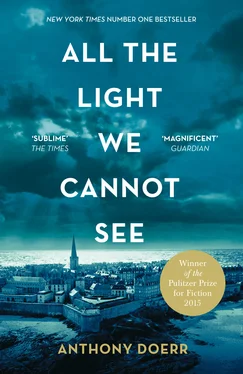1 ...8 9 10 12 13 14 ...23 “Papa says curses are only stories cooked up to deter thieves. He says there are sixty-five million specimens in this place, and if you have the right teacher, each can be as interesting as the last.”
“Still,” he says, “certain things compel people. Pearls, for example, and sinistral shells, shells with a left-handed opening. Even the best scientists feel the urge now and then to put something in a pocket. That something so small could be so beautiful. Worth so much. Only the strongest people can turn away from feelings like that.”
They are quiet a moment.
Marie-Laure says, “I heard that the diamond is like a piece of light from the original world. Before it fell. A piece of light rained to earth from God.”
“You want to know what it looks like. That’s why you’re so curious.”
She rolls a murex in her hands. Holds it to her ear. Ten thousand drawers, ten thousand whispers inside ten thousand shells.
“No,” she says. “I want to believe that Papa hasn’t been anywhere near it.”
Werner and Jutta find the Frenchman’s broadcasts again and again. Always around bedtime, always midway through some increasingly familiar script.
Today let’s consider the whirling machinery, children, that must engage inside your head for you to scratch your eyebrow … They hear a program about sea creatures, another about the North Pole. Jutta likes one on magnets. Werner’s favorite is one about light: eclipses and sundials, auroras and wavelengths. What do we call visible light? We call it color. But the electromagnetic spectrum runs to zero in one direction and infinity in the other, so really, children, mathematically, all of light is invisible .
Werner likes to crouch in his dormer and imagine radio waves like mile-long harp strings, bending and vibrating over Zollverein, flying through forests, through cities, through walls. At midnight he and Jutta prowl the ionosphere, searching for that lavish, penetrating voice. When they find it, Werner feels as if he has been launched into a different existence, a secret place where great discoveries are possible, where an orphan from a coal town can solve some vital mystery hidden in the physical world.
He and his sister mimic the Frenchman’s experiments; they make speedboats out of matchsticks and magnets out of sewing needles.
“Why doesn’t he say where he is, Werner?”
“Maybe because he doesn’t want us to know?”
“He sounds rich. And lonely. I bet he does these broadcasts from a huge mansion, big as this whole colony, a house with a thousand rooms and a thousand servants.”
Werner smiles. “Could be.”
The voice, the piano again. Perhaps it’s Werner’s imagination, but each time he hears one of the programs, the quality seems to degrade a bit more, the sound growing fainter: as though the Frenchman broadcasts from a ship that is slowly traveling farther away.
As the weeks pass, with Jutta asleep beside him, Werner looks out into the night sky, and restlessness surges through him. Life: it’s happening beyond the mills, beyond the gates. Out there people chase questions of great importance. He imagines himself as a tall white-coated engineer striding into a laboratory: cauldrons steam, machinery rumbles, complex charts paper the walls. He carries a lantern up a winding staircase to a starlit observatory and looks through the eyepiece of a great telescope, its mouth pointed into the black.
Maybe the old tour guide was off his rocker. Maybe the Sea of Flames never existed at all, maybe curses aren’t real, maybe her father is right: Earth is all magma and continental crust and ocean. Gravity and time. Stones are just stones and rain is just rain and misfortune is just bad luck.
Her father returns to the key pound earlier in the evenings. Soon he is taking Marie-Laure along on various errands again, teasing her about the mountains of sugar she spoons into her coffee or bantering with warders about the superiority of his brand of cigarettes. No dazzling new gemstone goes on exhibit. No plagues rain down upon museum employees; Marie-Laure does not succumb to snakebite or tumble into a sewer and break her back.
On the morning of her eleventh birthday, she wakes to find two new packages where the sugar bowl should be. The first is a lacquered wooden cube constructed entirely from sliding panels. It takes thirteen steps to open, and she discovers the sequence in under five minutes.
“Good Christ,” says her father, “you’re a safecracker!”
Inside the cube: two Barnier bonbons. She unwraps both and puts them in her mouth at the same time.
Inside the second package: a fat stack of pages with Braille on the cover. Twenty. Thousand. Leagues. Under. The. Sea.
“The bookseller said it’s in two parts, and this is the first. I thought that next year, if we keep saving, we can get the second—”
She begins that instant. The narrator, a famed marine biologist named Pierre Aronnax, works at the same museum as her father! Around the world, he learns, ships are being rammed one after another. After a scientific expedition to America, Aronnax ruminates over the true nature of the incidents. Are they caused by a moving reef? A gigantic horned narwhal? A mythical kraken?
But I am letting myself be carried away by reveries which I must now put aside, writes Aronnax. Enough of these phantasies.
All day Marie-Laure lies on her stomach and reads. Logic, reason, pure science: these, Aronnax insists, are the proper ways to pursue a mystery. Not fables and fairy tales. Her fingers walk the tightropes of sentences; in her imagination, she walks the decks of the speedy two-funneled frigate called the Abraham Lincoln. She watches New York City recede; the forts of New Jersey salute her departure with cannons; channel markers bob in the swells. A lightship with twin beacons glides past as America recedes; ahead wait the great glittering prairies of the Atlantic.
The Principles of Mechanics
A vice minister and his wife visit Children’s House. Frau Elena says they are touring orphanages.
Everyone washes; everyone behaves. Maybe, the children whisper, they are considering adopting. The oldest girls serve pumpernickel and goose liver on the house’s last unchipped plates while the portly vice minister and his severe-looking wife inspect the parlor like lords come to tour some distasteful gnomish cottage. When supper is ready, Werner sits at the boys’ end of the table with a book in his lap. Jutta sits with the girls at the opposite end, her hair frizzed and snarled and bright white, so she looks as if she has been electrified.
Bless us O Lord and these Thy gifts . Frau Elena adds a second prayer for the vice minister’s benefit. Everyone falls to eating.
The children are nervous; even Hans Schilzer and Herribert Pomsel sit quietly in their brown shirts. The vice minister’s wife sits so upright that it seems as if her spine is hewn from oak.
Her husband says, “And each of the children contributes?”
“Certainly. Claudia, for instance, made the bread basket. And the twins prepared the livers.”
Big Claudia Förster blushes. The twins bat their eyelashes.
Werner’s mind drifts; he is thinking about the book in his lap, The Principles of Mechanics by Heinrich Hertz. He discovered it in the church basement, water-stained and forgotten, decades old, and the rector let him bring it home, and Frau Elena let him keep it, and for several weeks Werner has been fighting through the thorny mathematics. Electricity, Werner is learning, can be static by itself. But couple it with magnetism, and suddenly you have movement—waves. Fields and circuits, conduction and induction. Space, time, mass. The air swarms with so much that is invisible! How he wishes he had eyes to see the ultraviolet, eyes to see the infrared, eyes to see radio waves crowding the darkening sky, flashing through the walls of the house.
Читать дальше












